Keeping the doors open at Yemen’s Al Mukalla Hospital
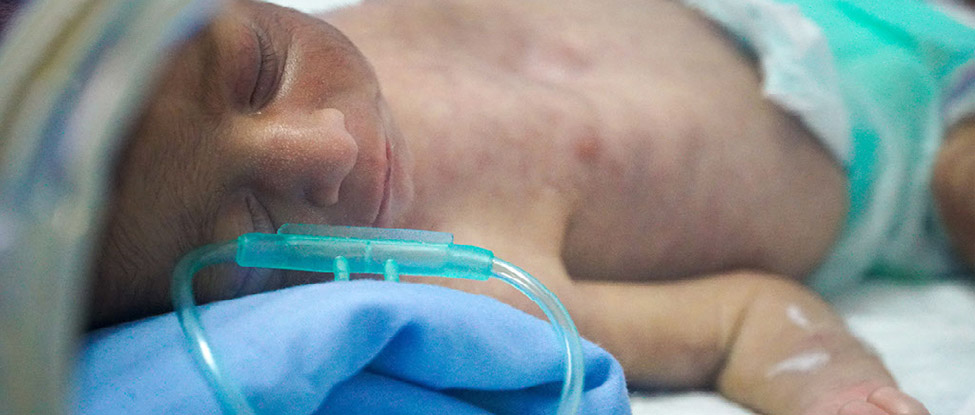
8 February 2023 – WHO is partnering with the Government of the United Arab Emirates (UAE) to ensure that pregnant mothers and newborns keep receiving vital and often life-saving care.
The Al Mukalla Hospital is the only public hospital providing obstetrics, gynecology, newborn care services in the seaport city of Al Mukalla, Yemen’s sixth-largest city. Public access to essential health services in the city has been continuously impacted by surrounding conflict since 2015. Meanwhile, the yearly number of births at the Al Mukalla Hospital has averaged between 4,000 and 7,000 from 2019 to 2022. The hospital is also a referral and medical training facility for Yemen’s largest governorate, Hadramaut, and its four surrounding governorates of Shabwah, Al-Mahrah, Sayoun, and Socotra.
Enhancing critical care capacities in Yemen
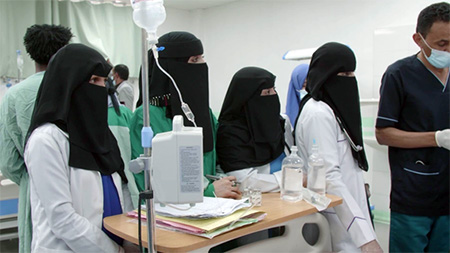 Sana’a, 15 January 2023 – The COVID-19 pandemic drew attention to weaknesses in critical and intensive care capacities in Yemen and other countries. To ensure hospitals are better equipped to meet these needs in the future, WHO and the authorities in Yemen, with support from the World Bank, are working hard to strengthen the health system and to build back better as part of the Yemen COVID-19 Response Project (YCRP).
Sana’a, 15 January 2023 – The COVID-19 pandemic drew attention to weaknesses in critical and intensive care capacities in Yemen and other countries. To ensure hospitals are better equipped to meet these needs in the future, WHO and the authorities in Yemen, with support from the World Bank, are working hard to strengthen the health system and to build back better as part of the Yemen COVID-19 Response Project (YCRP).
In June 2022, WHO launched a nine-week National Critical Care Training (NCCT) in Aden to build specialized skills among 48 doctors and nurses. The second cohort of this training recently concluded in Sana’a, bringing together 70 health workers (29% female) (28 doctors and 52 nurses) from public hospitals in 10 northern governorates.
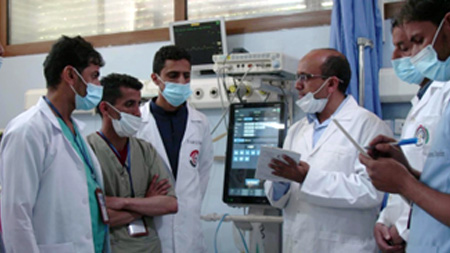 The participants were selected through a competitive process, with a written test administered by WHO. Following this, the selected participants underwent a pre-course test, where the average score was 45%. Half way through the course, already there was a noticeable improvement in participant skills and knowledge, with the mid-term exam average score of 73%. By the end of the course, the final test score average had increased once more to 80%.
The participants were selected through a competitive process, with a written test administered by WHO. Following this, the selected participants underwent a pre-course test, where the average score was 45%. Half way through the course, already there was a noticeable improvement in participant skills and knowledge, with the mid-term exam average score of 73%. By the end of the course, the final test score average had increased once more to 80%.
WHO Representative to Yemen, Dr Adham Rashad Ismail Abdel Moneim explained the importance of the training: “the NCCT uses an intensive and hands-on approach to teach frontline health workers life-saving skills. We are now planning to integrate this course into university curricula in Yemen, so that new graduates coming into hospitals, will have these vital competencies.”
One of the participants in Sana’a, Dr Naseer Al-Fahd, an emergency and intensive care physician at Al-Hazm Hospital, who has been practicing in the field for two years, shared his experience: “throughout the two months of the training, we have learned a lot theoretically and practically. We took the new knowledge back with us to our cities, and we were able to practice our skills… A while ago, we received a man who was injured in a car crash. His head and stomach were severely injured, and we had to act quickly. Based on the training we had, we started with securing his airway, stabilizing his blood pressure, conducting an E-FAST, as well as providing him with advanced trauma life support. This training helped us improve our skills to provide better services for patients.”
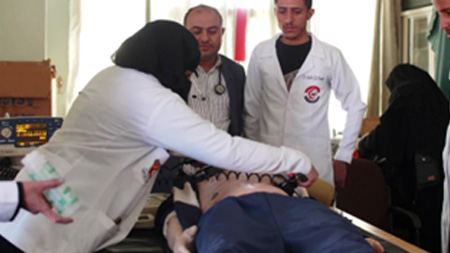 To maximize the impact of the NCCT, WHO will continue working with the World Bank under the Emergency Human Capital Project (EHCP) to integrate key learning areas from the course into university curricula. WHO will also support the cascading of basic and advanced life support training so that frontline health workers in all governorates of Yemen have the needed know-how to save lives.
To maximize the impact of the NCCT, WHO will continue working with the World Bank under the Emergency Human Capital Project (EHCP) to integrate key learning areas from the course into university curricula. WHO will also support the cascading of basic and advanced life support training so that frontline health workers in all governorates of Yemen have the needed know-how to save lives.
Related link
Building a specialized cadre of doctors and nurses to save lives in Yemen
Giving severely malnourished children a fighting chance
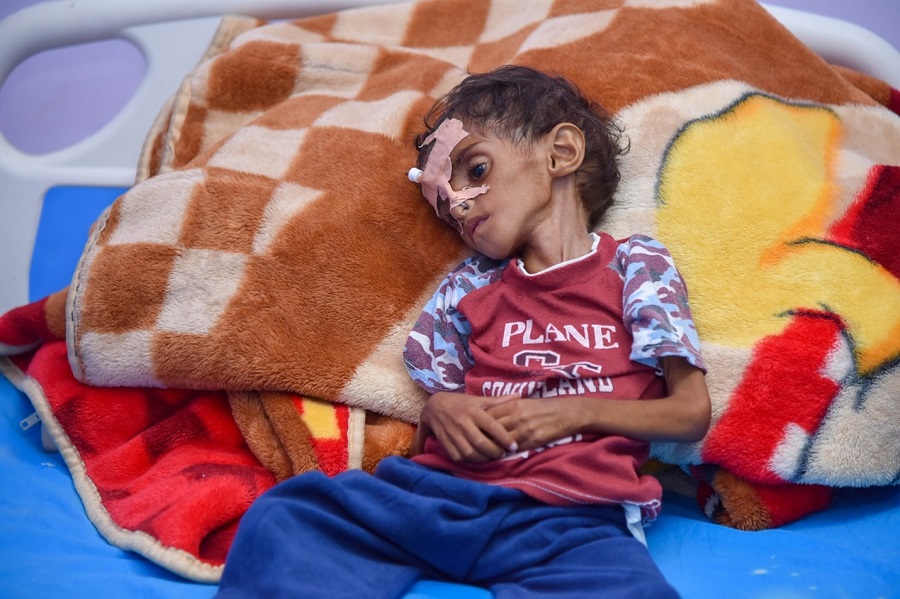
1 February 2023 – Imagine being forced to remain at home, watching your malnourished child waste away, with no money for their transportation or treatment. This is a reality for many parents in Yemen today.
The majority of Yemeni children below age 5 are highly likely to suffer the consequences of armed conflict and lack of basic life services from their first years of life. An estimated 4.1 million children will need humanitarian assistance in 2023, according to the Humanitarian Needs Overview analysis for this year.
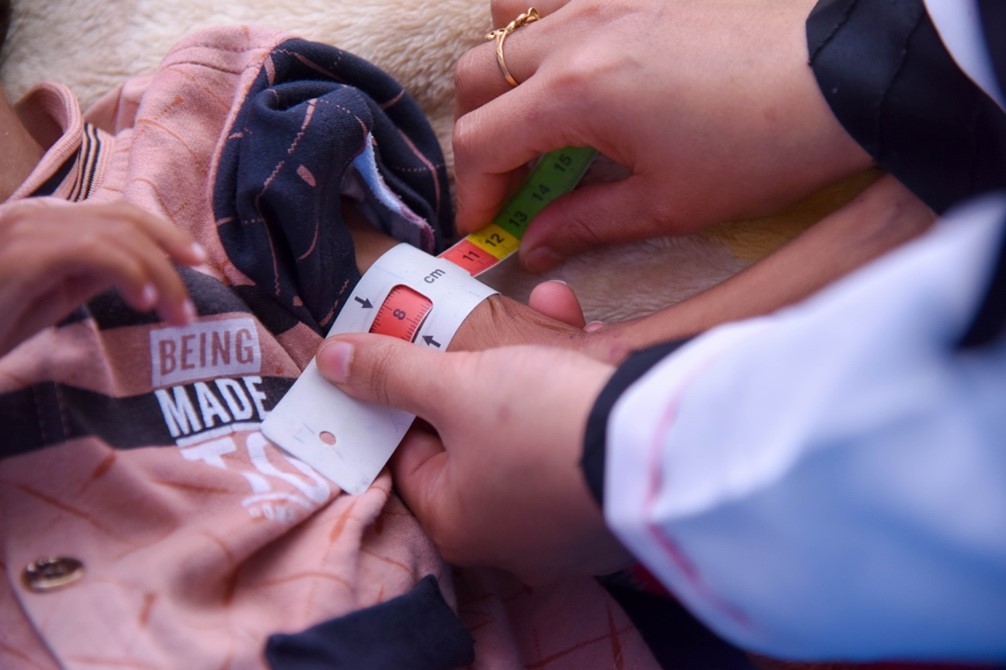 According to the Humanitarian Needs Overview analysis for 2023, an estimated 4.1 million children will need humanitarian assistance in 2023. Since the start of armed conflict in Yemen, an estimated 10 200 children have been killed or injured as a direct result of hostilities. This number include at least 47 confirmed child casualties during the first 2 months of 2022 (the actual number is likely higher).
According to the Humanitarian Needs Overview analysis for 2023, an estimated 4.1 million children will need humanitarian assistance in 2023. Since the start of armed conflict in Yemen, an estimated 10 200 children have been killed or injured as a direct result of hostilities. This number include at least 47 confirmed child casualties during the first 2 months of 2022 (the actual number is likely higher).
Maryam Ali is a nurse working at a therapeutic feeding centre (TFC) in Al Jumhuri hospital in Hajjah governorate. She has seen great suffering during her 16 years as a nurse, especially following the advent of armed conflict in 2015. She will always remember the children who have died from severe acute malnutrition (SAM) with medical complications when their families were unable to reach medical care in time.
“The support provided by WHO to the health facility since 2016 has been life-saving for the most vulnerable people in the area. This TFC was rehabilitated and restored to full functionality to provide quality, free of charge services,” said Maryam Ali.
“As health care workers, we need capacity building to continue working and providing better quality health services. That is why receiving incentive payments and trainings from WHO has made a positive impact on our lives and the lives of little children we treat there,” Maryam explained.
Yemen’s health system will remain overwhelmed in 2023, with its capacity potentially declining, if health workers go unpaid. The number of health workers is well below the global WHO standard – 12 health workers per 10 000 people compared with the standard’s 20 per 10 000; while 37% of functioning hospitals lack specialist doctors.
Zuhoor Hamed has brought her 4-month-old daughter to the WHO supported TFC in Al Jumhuri hospital in Hajjah barely weighing 2 kilograms. Frail and fighting for her life, she was provided with a lifesaving medical and nutriton care and is now showing improvement.
“My child is feeling better now, and we are being taken care of. The services are free of charge,” said the grateful mother.
With Yemen’s prolonged conflict exacerbating existing vulnerabilities within a severely weakened health system, less than half of health facilities are currently reported to be functioning. About 11 per cent are fully or partially damaged due to conflict. Access remains severely restricted, with approximately 42% of the population having to travel more than an hour to reach the nearest fully or partially functional public hospital.
Dr Ibrahim Al Ashwal, director of Al Jumhuri hospital in Hajjah, understands this situation all too well.
“This is the number one referral hospital in the governorate providing specialized medical care, and it serves communities in Hajjah as well as those coming in from surrounding districts,” he said. “The conflict has affected availability of resources for the people of Yemen. And so the support we are receiving from the WHO and UNCERF [United Nations Central Emergency Response Fund] is providing a chance at life for those who need it the most.”
Dr Ashwal thanked WHO and UNCERF for ensuring health facility functionality and operations through the support of fuel and electricity for secondary health structures and thus ensuring the provision of emergency, trauma and critical care (ICUs).
“Medical supplies and equipment are being provided to ensure quality, life-saving, and extremely critical emergency services for malnourished children in need of specialized assistance,” he added.
In partnership with UNCERF during the 7 months of the project, WHO has covered the operational costs of the therapeutic feeding centre at Al Jumhuri Hospital – effectively enabling quality case management of more than 1026 children. This support has covered costs of basic laboratory tests for admitted children, and provision of three daily meals to their caregivers during their hospital stays. Additionally, about 190 000 litres of fuel has been provided to this hospital in just the past 2 months for provision of health care services to more than 106 000 beneficiaries.
Majed Al Sogayah is a WHO emergency coordinator in Hajjah governorate. He works closely with beneficiaries and health care workers. Under his supervision, specific activities are conducted according to WHO protocol, with needed follow-up on any issues as well as coordinated deliveries of medical and non-medical supplies to the TFC in the hospital.
“The services provided to malnourished children in this centre are critical and were made possible through larger scale support, which has covered operational costs, incentives for health care workers, nutrition services, medicine supplies, rehabilitation and equipping of the centre,” explained Dr Sogayah.
“The free-of-charge services we provide alleviate financial burdens of those already struggling with other limitations including having to travel from distant villages with no money for transportation. WHO considered this when planning the project, so transportation costs were added to the support,” Dr Sogayah continued. “We ensure children and their mothers are cared for, from the moment they arrive to the centre to their departure,”
During the 7 months of the project, 9304 children suffering from malnutrition have been treated in the 19 supported TFCs and the pediatric wards linked to them in the three priority governorates of Hajja, Hodeida and Taiz. Through the WHO-supported nutrition surveillance system established in 74 health facility sentinel sites in these governorates, 134 446 children up to age 5 were screened for all forms of malnutrition. One in 3 of these children were referred for proper management in different health and nutrition services in the 19 supported hospitals.
In Al Jumhori hospital, 2052 of treated children and their caregivers were supported with transportation costs and admission kits. To ensure that health care services remain available for children arriving to all 19 TFCs, about 316 health personnel have been provided with incentive payments.
WHO thanks UNCERF for this partnership that continues to give many of Yemen’s severely malnourished children a fighting chance for survival – in the midst of endemic conflict, grinding poverty, homelessness and suffering that continue to afflict their families and communities.
Medicines or meals? Desperate choices for most vulnerable Yemenis
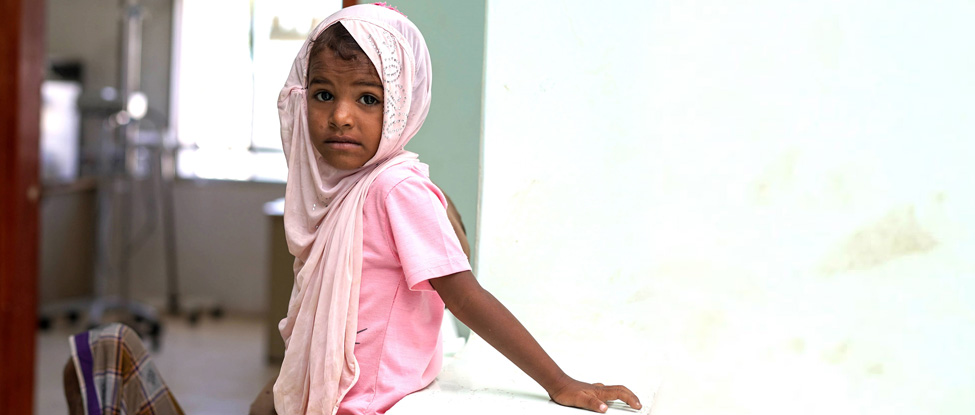
31 January 2023–Yemen’s economy and health systems rank among the least developed in the world. Overstretched health facilities struggle to provide even the most basic services to the country’s 34.24 million people. For most vulnerable Yemeni households, daily survival can be reduced to a desperate choice between needed medicines or a next meal.


